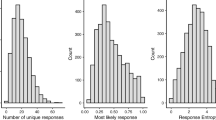Abstract
Word stem completion tasks involve showing participants a number of words and then later asking them to complete word stems to make a full word. If the stem is completed with one of the studied words, it indicates memory. It is a test widely used to assess both implicit and explicit forms of memory. An important aspect of stimulus selection is that target words should not frequently be generated spontaneously from the word stem, to ensure that production of the word really represents memory. In this article, we present a database of spontaneous stem completion rates for 395 stems from a group of 80 British undergraduate psychology students. It includes information on other characteristics of the words (word frequency, concreteness, imageability, age of acquisition, common part of speech, and number of letters) and, as such, can be used to select suitable words to include in a stem completion task. Supplemental materials for this article may be downloaded from http://brm .psychonomic-journals.org/content/supplemental.
Similar content being viewed by others
References
Benjamin Clarke, A. J., & Butler, L. T. (2008). Dissociating word stem completion and cued recall as a function of divided attention at retrieval. Memory, 16, 763–772.
Brooks J. O., III, Gibson, J. M., Friedman, L., & Yesavage, J. A. (1999). How to drastically reduce priming in word stem completion—and still present the words. Memory & Cognition, 27, 208–219.
Chiarello, C., & Hoyer, W. J. (1988). Adult age differences in implicit and explicit memory: Time course and encoding effects. Psychology & Aging, 3, 358–366. doi:10.1037/0882-7974.3.4.358
Fleischman, D. A., Monti, L. A., Dwornik, L. M., Moro, T. T., Bennett, D. A., & Gabrieli, J. D. E. (2002). Impaired production priming and intact identification priming in Alzheimer’s disease. Journal of the International Neuropsychological Society, 7, 785–794.
Fleischman, D. A., Wilson, R. S., Gabrieli, J. D. E., Bienias, J. L., & Bennett, D. A. (2004). A longitudinal study of implicit and explicit (Continued on next page) memory in old persons. Psychology & Aging, 19, 617–625. doi:10.1037/ 0882-7974.19.4.617
Graf, P., & Williams, D. (1987). Completion norms for 40 three-letter word stems. Behavior Research Methods, Instruments, & Computers, 19, 422–445.
Greene, R. L. (1986). Word stems as cues in recall and completion tasks. Quarterly Journal of Experimental Psychology, 38A, 663–673.
Kučera, H., & Francis, W. N. (1967). Computational analysis of present-day American English. Providence, RI: Brown University Press.
LaVoie, D. J., & Faulkner, K. M. (2008). Production and identification repetition priming in amnestic mild cognitive impairment. Aging, Neuropsychology, & Cognition, 15, 523–544. doi:10.1080/ 13825580802051497
Lee, L., & Leslie, K. (2003). Target words for the Word Stem Completion test in Australian patients. Anaesthesia & Intensive Care, 31, 184–186.
Leech, G., Rayson, P., & Wilson, A. (2001). Word frequencies in written and spoken English. Harlow, U.K.: Longman.
Martin, S., Dressaire, D., Guerdoux, E., Trouillet, R., Brouillet, D., Brouillet, T., & Maury, P. (2009). French word-stem completion norms by participants from 30 to 93 years old. Revue Européenne de Psychologie Appliquée, 59, 25–36. doi:10.1016/j.erap.2008.09.001
Olofsson, U., & Nyberg, L. (1992). Swedish norms for completion of word stems and unique word fragments. Scandinavian Journal of Psychology, 33, 108–116. doi:10.1111/j.1467-9450.1992.tb00890.x
Pope, J. W., & Kern, R. S. (2006). An “errorful learning deficit in schizophrenia? Journal of Clinical & Experimental Neuropsychology, 28, 101–110. doi:10.1080/13803390490918138
Roediger, H. L., III, Weldon, M. S., Stadler, M. L., & Riegler, G. L. (1992). Direct comparison of two implicit memory tests: Word fragment and word stem completion. Journal of Experimental Psychology: Learning, Memory, & Cognition, 18, 1251–1269. doi:10.1037/0278-7393.18.6.1251
Shaw, R. J. (1997). Unprimed stem completion is only moderately predicted by word frequency and length. Behavior Research Methods, Instruments, & Computers, 29, 401–424.
Sorond, F. A., Schnyer, D. M., Serrador, J. M., Milberg, W. P., & Lipsitz, L. A. (2008). Cerebral blood flow regulation during cognitive tasks: Effects of healthy aging. Cortex, 44, 179–184. doi:10.1016/ j.cortex.2006.01.003
Stadthagen-Gonzalez, H., & Davis, C. J. (2006). The Bristol norms for age of acquisition, imageability, and familiarity. Behavior Research Methods, 38, 598–605.
Warrington, E. K., & Weiskrantz, L. (1970). Amnesic syndrome: Consolidation or retrieval? Nature, 228, 628–630. doi:10.1038/228628a0
Wilson, D. E., & Horton, K. D. (2002). Comparing techniques for estimating automatic retrieval: Effects of retention interval. Psychonomic Bulletin & Review, 9, 566–574.
Wilson, M. (1988). MRC Psycholinguistic Database: Machine-usable dictionary, version 2.00. Behavior Research Methods, Instruments, & Computers, 20, 6–10.
Author information
Authors and Affiliations
Corresponding author
Electronic supplementary material
Rights and permissions
About this article
Cite this article
Migo, E.M., Roper, A., Montaldi, D. et al. British English norms for the spontaneous completion of three-letter word stems. Behavior Research Methods 42, 470–473 (2010). https://doi.org/10.3758/BRM.42.2.470
Received:
Accepted:
Published:
Issue Date:
DOI: https://doi.org/10.3758/BRM.42.2.470



